
The Transfiguration of Blind Joe Death is a 1965 album by American fingerstyle guitarist and composer John Fahey. Originally issued in a hand-lettered edition of 50, it was Fahey's first album to be released by a label other than his own Takoma Records. As with all of Fahey's independently released early albums, it had little critical recognition upon release. The album has grown in stature since its reissue on CD in 1997 and is now highly regarded critically. It was Fahey's fourth album to see release, though after his fifth album, The Great San Bernardino Birthday Party & Other Excursions, was labeled Guitar Vol. 4, reissues of The Transfiguration of Blind Joe Death were subtitled John Fahey, Volume 5.

Jack Rose was an American guitarist originally from Virginia and later based in Philadelphia. Rose is best known for his solo acoustic guitar work. He was also a member of the noise/drone band Pelt.
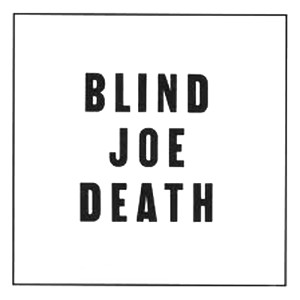
Blind Joe Death is the first album by American fingerstyle guitarist and composer John Fahey. There are three different versions of the album, and the original self-released edition of fewer than 100 copies is extremely rare.

The Voice of the Turtle is the seventh album by American guitarist John Fahey. Recorded and released in 1968, it is considered one of his more experimental albums, combining not only folk elements, but shreds of psychedelia, early blues, country fiddles, ragas, and white noise. The album had many reissues with various track listings, jacket designs and mismatched titles.
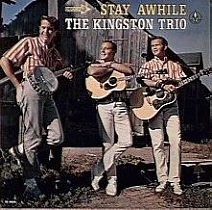
Stay Awhile is an album by the American folk music group the Kingston Trio, released in 1965. It was their second release on the Decca label. It continued their downward slide in the charts, reaching number 126 on the Billboard Pop Albums chart. The single "Yes I Can Feel It" b/w "Stay Awhile" did not chart.

The Yellow Princess is the ninth album by American folk musician John Fahey. Released in 1968, it was his second and last release on the Vanguard label.
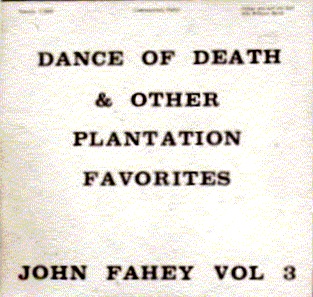
The Dance of Death & Other Plantation Favorites is the third album by American fingerstyle guitarist and composer John Fahey, released in 1965. The 1999 reissue contained four previously unreleased tracks.
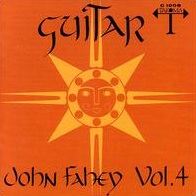
The Great San Bernardino Birthday Party & Other Excursions is an album by American fingerstyle guitarist and composer John Fahey, released in 1966. The cover simply labels the album Guitar Vol. 4 while the liner notes label it The Great San Bernardino Birthday Party & Other Excursions. The title never appeared on the record labels themselves. It marked the beginning of Fahey's interest in his recording of experimental soundscapes and sound effects. Despite Fahey's distaste for the 1960s counterculture, it is his release most often referred to as psychedelic.

America is an album by American folk musician John Fahey, released in 1971. Originally intended to be a double album, it was released as a single LP. The unreleased material was subsequently restored in later CD and vinyl reissues.

After the Ball is an album by the American folk musician John Fahey, released in 1973. It was his second and last recording on the Reprise label and like its predecessor, Of Rivers and Religion, it sold poorly.

The Best of John Fahey 1959–1977 is a compilation album by American fingerstyle guitarist and composer John Fahey, released in 1977. The songs are collected from four of Fahey's dozen or so releases up to that point.
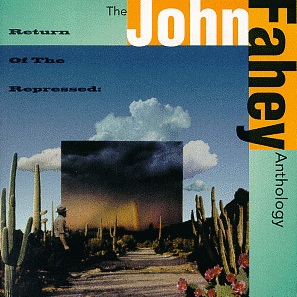
The Return of the Repressed: The John Fahey Anthology is a compilation album by American fingerstyle guitarist and composer John Fahey, released in 1994. Fahey's career, health and personal life had been in decline. The release of The Return of the Repressed, along with an article in Spin magazine by Byron Coley served to provide a renewal of his career.

The Essential John Fahey is a compilation album by American fingerstyle guitarist and composer John Fahey, released in 1974.

City of Refuge is an album by American fingerstyle guitarist and composer John Fahey, released in 1997. It was his first original release in over five years and helped start his career resurgence.
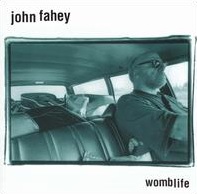
Womblife is an album by American fingerstyle guitarist and composer John Fahey, released in 1997. It was one of three releases by Fahey that year.

The Great Santa Barbara Oil Slick is a live album by American fingerstyle guitarist and composer John Fahey, released posthumously in 2004.

Railroad is an album by American fingerstyle guitarist and composer John Fahey, released in 1983. It was originally released as Railroad 1 by mistake. The Shanachie Records reissue is correctly labeled as Railroad. It was his last principal recording for Takoma Records, the label he founded in 1959.

Yes! Jesus Loves Me is an album by American fingerstyle guitarist and composer John Fahey, released in 1980. It was Fahey's poorest selling release.

"Mandolin Wind" is a song written by Rod Stewart. It was first released on Stewart's 1971 album Every Picture Tells a Story and later as the B-side of a single from that album, his version of "(I Know) I'm Losing You." Mercury Records issued the song as a 7-inch single in mid-1977. It has also appeared on numerous Rod Stewart compilation and live albums, including Sing It Again Rod, Storyteller – The Complete Anthology: 1964–1990 and Unplugged...and Seated.
Pelt is a drone music group formed in Richmond, Virginia in 1993.



















